- Home
- Thornton Wilder
The Eighth Day
The Eighth Day Read online
DEDICATION
For Isabel Wilder
CONTENTS
DEDICATION
FOREWORD BY JOHN UPDIKE
PROLOGUE
I “THE ELMS” 1885–1905
II ILLINOIS TO CHILE 1902–1905
III CHICAGO 1902–1905
IV HOBOKEN, NEW JERSEY 1883
V “ST. KITTS” 1880–1905
VI COALTOWN, ILLINOIS, CHRISTMAS, 1905
AFTERWORD BY TAPPAN WILDER
ACKNOWLEDGMENTS
ABOUT THE AUTHOR
BACK ADS
ALSO BY THORNTON WILDER
CREDITS
COPYRIGHT
ABOUT THE PUBLISHER
FOREWORD
The Eighth Day was published in late March of 1967, three weeks before Thornton Wilder’s seventieth birthday. Reviews were mixed, from Edmund Wilson’s calling it “the best thing he ever wrote” to Edith Oliver’s judgment, in The New Yorker, that “None of the characters, major or minor, is essentially credible to the reader” and Stanley Kaufmann’s, in The New Republic, that “we have—from a man who has always meant well—a book that means nothing.” Nevertheless, Wilder’s first novel in nearly twenty years had Book-of-the-Month endorsement, spent twenty-five weeks on the bestseller list, and won the 1968 National Book Award. I was one of the judges, much the youngest; the other two were Granville Hicks and Josephine Herbst. Hicks and I wanted the award to go to Wilder; Herbst gracefully acceded, and my two senior colleagues asked me to write the citation. On the spot I scratched it off:
Through the lens of a turn-of-the-century murder mystery, Mr. Wilder surveys a world that is both vanished and coming to birth; in a clean gay prose sharp with aphoristic wit and the sense and scent of Midwestern America and Andean Chile, he takes us on a chase of Providence and delivers us, exhilarated and edified into the care of an ambiguous conclusion.
Having just reread, thirty-five years later, The Eighth Day, I am only slightly disposed to quarrel with this rash summary. The “coming to birth” and “chase of Providence” seemed muted the second time around, with a louder emphasis on the misery and muddle of the human condition. “Clean gay” are not the words with which I would now characterize the prose, though there is considerable gaiety in the narration’s swift onward flow, its sudden pools of rumination and opinionizing, its pleasure in its own inventions, the impish leaps in time that telegraph crucial plot developments so quickly we can scarcely believe our eyes, and the globe-spanning nimbleness and cosmic lift-off of it all.
Wilder was the product of a pious (though progressive and cultured) Protestant household and Christian educational institutions; he kept religion’s bias—its basic gaiety—while leaving the dogmas behind. His comedies skate on the skin of the void. If not a theist like Teilhard de Chardin and Kierkegaard, whom he admired and drew upon, he declined to write off the universe as a bad job. His Caesar in The Ides of March (1948) writes a friend that he is not certain “that in no corner of my being there lingers the recognition that there is a possibility of a mind in and behind the universe which influences our minds and shapes our actions”; in a later letter he confesses, “Yet even in my last bitterness I cannot disavow the memory of bliss. Life, life has this mystery that we dare not say the last word about it, that it is good or bad, that it is senseless, or that it is ordered.” In Wilder’s personal journal, on August 14, 1955, he chastised himself for his unexpungeable religiosity:
I must emerge from this dibble-dabble in religious subject-matter; I must shake my whole self and learn what I do and do not believe, or else eschew such themes altogether. I am ashamed of this lukewarm imitative dilettante religiosity. Pfui!
As late as 1968, he had not made up his mind; he wrote to an inquirer who had asked what his philosophy was, “I’m optimist and pessimist and religious and non-religious. I try ’em out for size. I’m tossed from pole to pole. I’m an awful wobbler.” Wobbling may be the way most people get through life, but it doesn’t win intellectual friends; literary critics who could accept Roman Catholicism and high Anglicanism and Communism as counters in a desperate game of twentieth-century commitment had little patience for Wilder’s God-tinged half-optimism. He was dismissed as sentimental when he was being realistic, in the skeptical yet hopeful American style.
The Eighth Day revisits and extends the small-town world of Our Town (1938), the stark and dreamy drama which turns out to be one of the most enduring and beloved of American plays. The play and the novel share provincial location (southern New Hampshire, southern Illinois), two households with romantically entwined offspring, an intervening village explainer (the Stage Manager, the nameless narrator), and a brooding sense of cosmic import within ordinary human events. The Stage Manager states:
We all know that something is eternal. And it ain’t houses and it ain’t names, and it ain’t earth, and it ain’t even the stars . . . ? everybody knows in their bones that something is eternal, and that something has to do with human beings. . . . ? There’s something way down deep that’s eternal about every human being.
Both works are located in turn-of-the-century, pre-automobile America, when Wilder was a very small child; the young people of these dramas are almost a generation older than he. Nor did he experience a settled small-town upbringing. Born in Madison, Wisconsin, where his father, Amos Wilder, ran a financially challenged newspaper, he was moved before his ninth birthday to Hong Kong; his father had managed, through his Yale friend William Howard Taft, to secure President Theodore Roosevelt’s appointment as consul general there. Before the year was out, Isabella Wilder took her four children back to the United States—to Berkeley, California, where they lived until late 1910, when they again sailed across the Pacific to rejoin the head of the household, who had been promoted to the consulship in Shanghai. Thornton was placed in the China Inland Mission Boys and Girls School four hundred fifty miles to the north. There Thornton learned Latin and loneliness and the look of human misery; China was in the throes of Sun Yat-sen’s revolution. More dispersals followed: Mrs. Wilder, now the mother of five, took the two youngest children, both daughters, to join her sister in Florence, and at the age of fifteen Thornton joined his older brother, Amos, at the Thacher School in California’s Ojai Valley. In its sporty, outdoor atmosphere he first tasted the joys of participating in organized theatrics, though his father forbade him from taking the female role of Lady Bracknell in The Importance of Being Earnest. But then his mother returned from Italy and Thornton was enrolled in Berkeley High School, from which he graduated in 1915, going on to two years at Oberlin and then to Yale, from which, after eight wartime months in the Coast Guard Artillery Corps, he graduated in 1920. He proceeded to a year at the American Academy in Rome, studying Latin and archeology and gathering the impressions for his first novel, The Cabala (1926). So scattered an upbringing provided the model, we can conjecture, not only for the diaspora of The Eighth Day’s Ashley family, with its absentee father and withdrawn mother, but for the peripatetic life that the adult Wilder, once he was affluent and widely acquainted, pursued, lugging his manuscripts and fitful inspirations from one hotel room to another.
He was a gregarious man, fond of talk and drink and late hours, with a rapacious and whimsical intellectual curiosity: he devoted hundreds of hours to his exegesis of Finnegans Wake and his dating of the hundreds of plays by the Spaniard Lope de Vega. Of the American writers his age, a formidable group including Hemingway, Faulkner, Fitzgerald, and Dos Passos, he was much the most erudite and academically inclined, teaching French at the Lawrenceville School from 1921 to 1928 and English at the University of Chicago from 1930 to 1936. In 1950 he undertook to deliver the Norton Lectures, a series of six, at Harvard, and found himself so enmeshed in other duties, academic
and social, that he broke down in March and never did complete the series, though he had flooded his journals with enough vigorous thoughts on the American classics to flesh out twenty lectures. A play called The Emporium similarly stalled. Another, long in the works, called The Alcestiad, conspicuously flopped in Edinburgh. Insomnia, honors, unrealized operatic projects, relentless travel: at the age of sixty-five, recognizing that he was in danger of frittering his talent away in busy-ness, Wilder announced a retreat to the Southwest, where, he told the New York Times, he would live “without neckties, without shoelaces and without cultivated conversation.” His car broke down in Douglas, Arizona, and there he stayed, first in a hotel and then in a bachelor apartment. In nine months he wrote his sister Isabel that he had ninety pages of a novel, a long family saga, an adventure story, “as though Little Women were being mulled over by Dostoevsky.” It was tentatively called Anthracite, after its fictional Illinois town, and then Make Straight in the Desert, after a quote from Isaiah, and finally The Eighth Day. He left Arizona with the novel unfinished, his labors on it were sandwiched into many trips—to Nice and Cannes, to the Netherlands Antilles, to the White House to accept the first National Medal for Literature, to Casablanca, and so on; in late 1965 he wrote his sister, “All I need is a hotel room. It looks as if I may be able to finish the book by January, but not the last finished touches.” One can suspect that it might have been a more unified book if he had stayed at his desk in Connecticut, but writing on the run had often been Wilder’s way; distraction and stimulation were close kin. As a child he had been chastised for “jumpiness,” and as a well-off bachelor at ease in the major languages of Europe, he confessed to “a mania for constant change.” Composed in many locales, the novel offers a parade of persuasively carefully realized settings: aside from Coaltown there are Chicago, Hoboken, Andean Chile, the Caribbean island of St. Kitts, with quick trips to Iowa, New Orleans, Russia, and upstate New York. Wilder, who in The Bridge of San Luis Rey (1936) had invented a persuasive Peru from whole cloth, played upon the world’s map as on the keyboard of a clavier.
His evocation of Coaltown, set forth in the Prologue with the firmness of a hand that has penned many stage directions, is memorably emblematic: a town built between two tall bluffs, so it never sees a dawn or sunset, further darkened by the dust of its coal mines, strung out along “an unhappy stream, the Kangaheela,” with the two notable homes, the Ashleys’ and the Lansings’, at either end. In the plot’s throng of incidents and images, some stand out as especially poetic and moving—written, as it were, in warmer ink. The first chapter, “The Elms,” reminiscent of Little Women, in which Sophia alone and then her sisters and mother get themselves together to create a boardinghouse on the ruins of their fortune and reputation, combines, as the isolated family’s tiny triumphs mount, the chirpiness and speed of stage action with a real sense of social humiliation and economic peril; Wilder must have dipped back into his childhood memories of insecurity, as his family fled debt for the strangeness of China. The heroic Sophia, a mere fourteen, and destined for her own breakdown, alone of the Ashleys seems fully human, without the rather cool imperviousness of the others. The savage dialogue, late in the book, of the ailing Breckinridge Lansing with his long-suffering wife, also bares a warm vein of intimacy both cruel and weary; we can taste the marriage. Wilder usually, even in the sketchy Our Town, places his venues on a geological base, the earth felt in its dwarfing antiquity and grudging usefulness; the mines of The Eighth Day function as magnificent images of human endeavor pitted against dark and adamant matter, exposed to view when the abandoned mines collapse after heavy rains:
The townspeople would drive out to peer into these earthworks. They seemed more to resemble the ruins of some past greatness than the prisons where so many had labored twenty hours—later, ten hours—a day and where so many had coughed and spat their lungs away. Even small boys were hushed by the view of those long galleries and arcades, rotundas and throne rooms.
Throne rooms! The gods are there, underground. “By the following year squaw bush and wild vines were covering the entrances to the underworld. The population of bats increased, emerging at first in whirling clouds above the valley.”
Wilder, called “tirelessly eclectic” by one critic, wove a number of borrowed ideas into The Eighth Day. The idea of the title, that we are entering a new week of Creation, though expressed by Coaltown’s omniscient Dr. Gillies, was taken from Teilhard de Chardin. Quiet, unobtrusive John Ashley, “odd through a very lack of striking characteristics,” was meant to represent Kierkegaard’s “knight of faith,” of whom the Danish philosopher writes in Fear and Trembling, “No heavenly glance or any other token of the incommensurable betrays him; if one did not know him, it would be impossible to distinguish him from the rest of the congregation.”* Though it might be doubted that John Ashley’s tranquil demeanor and kindly acts sufficiently distinguish him, the notion of a hidden elect, a cabal, a saving remnant, a secret masonry of virtue whose members recognize one another, was not just an idea to Wilder; it was a distinct sensation. In his first novel, the ancient gods struggle on, and in his superb fourth, Heaven’s My Destination (1935), the knight of faith, twenty-three-year-old George Brush, affronts Depression-era America with his naive Christianity; when his faith and health fail, he is saved by a sign—the bequest of a spoon, with its apostolic associations—from another of the world’s rare believers, Father Pasziewski of Kansas City. In The Eighth Day, the fugitive John Ashley encounters a succession of women—Mrs. Hodge, Maria Icaza, Mrs. Wickersham—who clairvoyantly protect him and pass him on. As he parts from the last, the narrator tells us, “The leave-takings of the children of faith are like first recognitions.”
Children of faith, poets and saints, dot the cruel world, and give Wilder’s novels a reticular tension, the suspense of a hidden design about to emerge—“the unfoldment of God’s plan for the world,” as John Ashley remembers his grandmother saying in prayer. In The Eighth Day, however, the traces of Providence are subsumed in a tracery of heritage, as the genealogies of the Ashleys and the Lansings are displayed, illustrative pieces of “that enormous tapestry” which is human history. As with the Wilder family, two common threads are celebrity and eccentricity—though the Wilders, as far as I know, did not share the Ashleys’ tendency to big feet and prominent ears, nor the rich racial mix and mismatched eyes that Eustacia Sims brought to the blond Iowa Lansings. Fame and distinction come readily to these children of Coaltown when they leave their narrow sunless valley—heights of journalism, singing, acting, social activism are quickly reached. As he approaches seventy the author can scarcely imagine a life uncrowned by honors and high regard, such as a funeral “with military bands and statesmen in silk hats” or a flower from the Emperor of Japan.
But among these fictional children George Lansing is half-crazy and Sophie suffers an early breakdown, and a restless, jittery, nervous streak came with Thornton Wilder’s inheritance. His mind was not just active but hyperactive; browsing through his journals, with their extravagant wealth of large ideas, is giddying. Aborted and frivolous projects litter his curriculum vitae; the concentration, economy, and solid calm of his best work were achieved, we feel, by a man determinedly holding himself fast to the earth. Like John Ashley in his own son’s eyes, he was “high, high up”—he gravitated to the elevated view, portraying the human adventure as a planetary incident. By The Skin of Our Teeth (1942) he wears this cosmic scope as a comic confusion; The Eighth Day—his one real novel, he said, and much his longest—opens itself to the digression, the sermonette, the stray inspiration that might capture the simultaneous largeness and smallness of the human adventure. Untidily, self-delightingly, it brims with wonder and wisdom, and aspires to prophecy. We marvel at a novel of such spiritual ambition and benign flamboyance.
JOHN UPDIKE
Beverly Farms, Massachusetts
PROLOGUE
In the early summer of 1902 John Barrington Ashley of Coaltown, a small min
ing center in southern Illinois, was tried for the murder of Breckenridge Lansing, also of Coaltown. He was found guilty and sentenced to death. Five days later, at one in the morning of Tuesday, July 22, he escaped from his guards on the train that was carrying him to his execution.
That was the “Ashley Case” that aroused considerable interest, indignation, and derision throughout the Middle West. No one doubted that Ashley shot Lansing, willfully or accidentally; but the trial was felt to have been bungled by a senile judge, an inept defense, and a prejudiced jury—the “Coalhole Case,” the “Coalbin Case.” When, to top it all, the convicted murderer escaped from a guard of five men and vanished into thin air—handcuffed, in prison garb, and with shaved head—the very State of Illinois was held up to ridicule. About five years later, the State’s Attorney’s office in Springfield announced that fresh evidence had been uncovered fully establishing Ashley’s innocence.
So: there had been a miscarriage of justice in an unimportant case in a small Middlewestern town.
Ashley shot Lansing in the back of the head while the two men were engaged in their customary Sunday afternoon rifle practice on the lawn behind the Lansing house. Even the defense did not claim that the tragedy was the result of a mechanical accident. The rifle was repeatedly fired for the benefit of the jurors and was found to be in excellent condition. Ashley was known to have been a superior marksman. The victim was five yards to the front and left of Ashley. It was a little surprising that the bullet entered Lansing’s skull above his left ear, but it was assumed that he had turned his head to catch the sounds issuing from a young people’s picnic in the Memorial Park across the hedge. Ashley never wavered in his assurance that he was innocent in both intention and deed, laughable though the assertion was. The only witnesses were the wives of the accused and the victim. They were sitting under the butternut trees nearby making lemonade. Both testified that only one shot had been fired. The trial was unduly prolonged because of illness among members of the court, and even death among the jurors and their alternates. Reporters called attention to the delay occasioned by laughter, for a demon of contrariety hovered over the hall. There were frequent slips of the tongue. Witness followed witness in a confusion of names. Judge Crittenden’s gavel broke. A St. Louis reporter called it the “Hyena Trial.”

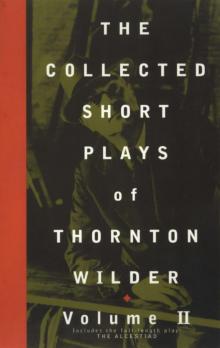 The Collected Short Plays of Thornton Wilder, Volume II
The Collected Short Plays of Thornton Wilder, Volume II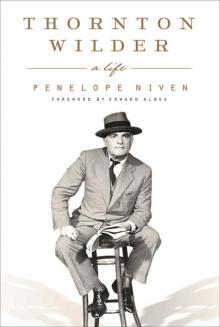 Penelope Niven
Penelope Niven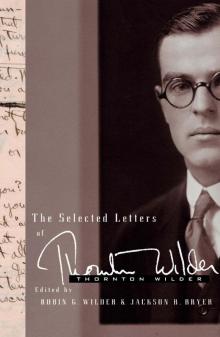 The Selected Letters of Thornton Wilder
The Selected Letters of Thornton Wilder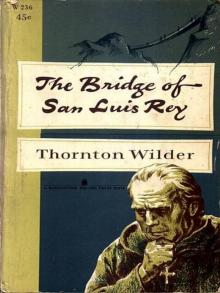 The Bridge of San Luis Rey
The Bridge of San Luis Rey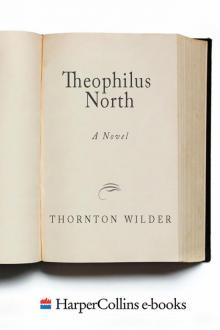 Theophilus North
Theophilus North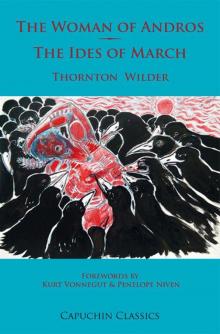 The Woman of Andros / the Ides of March
The Woman of Andros / the Ides of March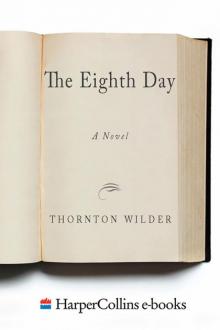 The Eighth Day
The Eighth Day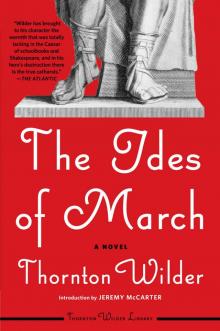 The Ides of March
The Ides of March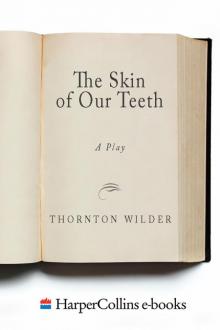 The Skin of Our Teeth
The Skin of Our Teeth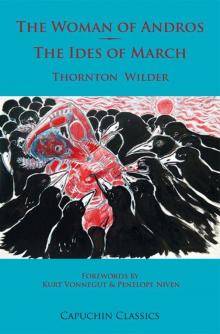 The Woman of Andros and The Ides of March
The Woman of Andros and The Ides of March